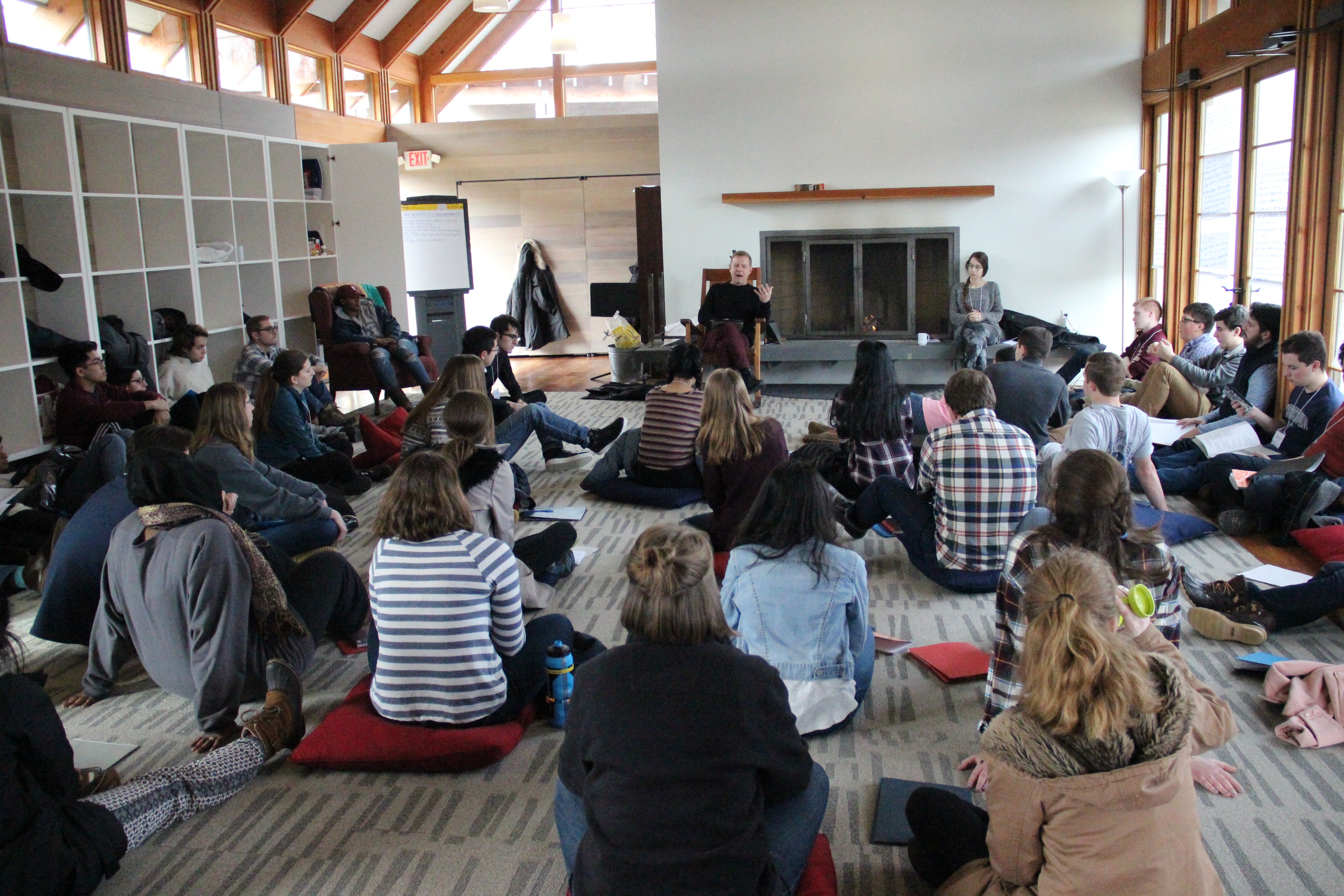The Importance of Awareness: A Reflection on the CM Student Leadership Retreat
The Campus Ministry Student Leadership Retreat is an annual, interfaith overnight opportunity for leaders from across our programs. Students share and build upon existing involvement through community formation activities, skill-based workshops, development discussions and reflection.
No matter how many different ways I involve myself in Campus Ministry, what never fails to surprise me is the power and importance of the retreats. In my time so far at Georgetown, I have attended six retreats, each of which has brought me new gifts. Nothing was different this last time around; even when I least expected it, the Spring 2017 Campus Ministry Student Leadership Retreat taught me the importance of self- and other-awareness.
While the ideas of self- and other-awareness are certainly very obvious cornerstones of leadership, the retreat still took me by surprise when it enabled me to dig deeper than I had before. In my other leadership roles on campus, I am required to fulfill sets of obligations and check off duties from a list. Some of these rules do require a level of awareness of myself and others, but never in such a dire and extensive manner. For with faith groups, the importance of being aware of how impactful a personal leadership style can be and of how important it is to maintain a constant awareness of the community can never be understated.
Shortly after reaching the retreat center, we did a few activities that are commonly seen as icebreakers, but on our retreat they were framed as a leadership activity. In one simple statement from a facilitator, my view on icebreakers was changed: “you cannot be a leader unless you know who is in the room.” How true a statement that was! Though I was, as a leader, able to recognize the importance of knowing–really knowing, not just superficially knowing–the people I serve, I had never seen it as a constant and active part of leadership. Suddenly, this simple tenet of being aware of who is in the room and with whom I am situated transformed from a pre-requisite to leadership, to an active component of it.
In one of the other more striking activities in which we participated in the retreat, we were instructed to create small groups and discuss a controversial, personal, and divisive topic amongst ourselves. With little instructions and no ground rules, I proceeded to follow my group into a small room where we took up the topic of straying from religious tenets based on personal moral convictions (i.e. what happens when one strays from traditional religious teachings that one perceives as wrong or inapplicable). In one of the most high-stakes but low-stress conversations I had ever participated in, I was able to learn about empathetic listening: listening with the intent of seeing another person, feeling their emotions, and feeling compelled to take action on their part. Though my opinions were unswayed, I learned what it was like to participate in a respectful dialogue that leaves room for questions, opinions, and convictions, all at the same time.
The second half of the retreat had a heavy focus on social justice. We addressed the baseline topics of creating inclusive communities and of recognizing one’s own privilege. It was in this part of the retreat that my awareness of myself and others went deeper than it had before. In the activity that we did for recognizing privilege, participants had to pick up a colored bead that represented a statement that could be said with privilege. After putting the beads together on a string, we had a powerful visual of our privileges and the ways in which they interacted. One student commented during our reflection on the activity how we all held certain privileges, and with those privileges comes the ability to create social change. After all, as leaders we are blessed with the ability to change our communities, and with all the collective privilege that we hold as a group, it is our responsibility to enact that change.
I’ll be the first to admit that at first, I did not entirely understand the importance of discussing social justice on a leadership retreat. As a YLEAD alumna, I cared deeply about issues of social justice–particularly those surrounding religious discrimination–and I could see why it was important for leaders to create inclusive communities. But after reflecting in my journal and with the large group, a bigger picture emerged for me: social justice is the foundation of strong leadership. For without a sense of social justice, without the desire to eliminate inequality and social transgressions, no leader can meet the needs of the people served. Every individual in a community inherently has different needs, and it is up to the leader to be able to understand the context of those needs and strive to serve them Those needs will undoubtedly stem from topics that social justice missions cover.
Furthermore, faith groups on campus constitute some of the most open student communities on the Hilltop. While students are denied from clubs at every corner, faith groups open their doors and keep them open throughout the entire year for anyone to enter. But without a sense of social justice, there can be an invisible glass door that keeps out members of socially marginalized identities. It is then up to the leader to be able to recognize where those glass doors keep Hoyas out, and up to the leader to remove whatever barriers are there to social inclusion.
As I reflected at the close of the retreat, I found myself grateful to Campus Ministry for providing me with the opportunity to develop my leadership skills. With this growing opportunity for faith-based student leadership development, Hoyas will finally be equipped with the tools they need to be able to create, lead, and expand faith communities on the Hilltop.
Written by Piyusha Mittal, F’18
- Tagged
- Interfaith
- Retreats

